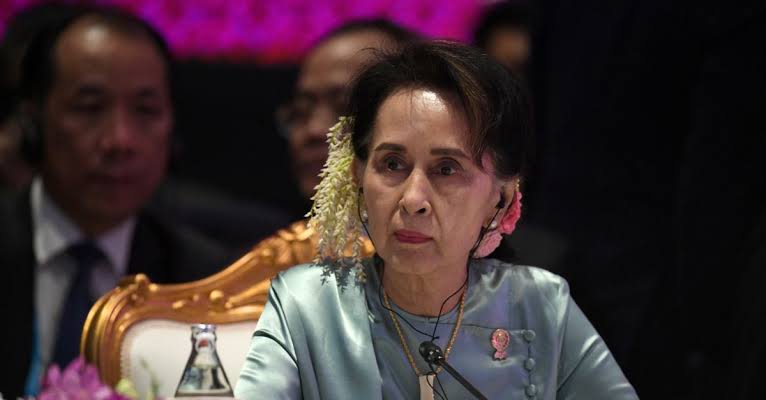According to a legal official, a special court in Myanmar’s capital sentenced the country’s ousted leader, Aung San Suu Kyi, to four years in prison on Monday after finding her guilty of incitement and violating coronavirus restrictions.
The sentence was the first in a series of cases in which the 76-year-old Nobel laureate has been prosecuted since the army seized power on Feb.1, preventing her National League for Democracy party from launching a second five-year term.
The outcome of a separate case against her is expected next week.
If she is found guilty in all of the cases she is facing, she could face a sentence of more than 100 years in prison.
According to the legal official, the court did not specify whether Suu Kyi would be sentenced to prison or placed under house arrest for the two convictions on Monday.
She has been under house arrest for 15 years, beginning in 1989, as part of her long struggle for democracy.
The incitement case involved statements posted on her party’s Facebook page after she and other party leaders had already been detained by the military, whereas the coronavirus charge involved a campaign appearance ahead of elections last November, which her party overwhelmingly won.
The army, whose allied party lost many seats in the election, claimed widespread voting fraud, but independent election observers found no significant irregularities.
The court’s decision in Naypyitaw was conveyed by a legal official who requested anonymity for fear of repercussions from the authorities.
Suu Kyi’s trials are closed to the media and spectators, and her lawyers, who had been the only source of information on the proceedings, were served with gag orders prohibiting them from disclosing information in October.
More information about the ruling could not be obtained immediately from government officials.
Special courts, which were established as a result of British colonial rule, are appointed to hear specific cases.
They are most frequently used in political cases.
According to the legal official, defense lawyers for Suu Kyi and two colleagues who were also convicted on Monday are expected to file appeals in the coming days.
The cases brought against Suu Kyi are widely regarded as fabricated in order to discredit her and prevent her from running in the next election.
Anyone sentenced to prison after being convicted of a crime is barred from holding high office or becoming a legislator under the constitution.
Ten months after the army took over, opposition to military rule remains strong, and the verdict may exacerbate tensions even further.
On Sunday, there were marches against the military government, as well as calls for the release of Suu Kyi and other detained members of her political group.
According to unconfirmed reports, an army truck deliberately rammed into a march of about 30 young people in Yangon, the country’s largest city, killing at least three of the protesters.
Suu Kyi’s first two cases, on incitement — for allegedly spreading false or inflammatory information that could disrupt public order — and violating the Natural Disaster Management Law — for allegedly violating coronavirus restrictions — were supposed to be delivered last Tuesday.
However, the court postponed its decision without explanation.
At the same time, it decided to allow testimony this week on a different coronavirus accusation from an additional defense witness who had previously been unable to attend court due to illness.
Suu Kyi’s lawyers fought hard to have the incitement charge dropped.
The prosecution’s evidence consisted of statements posted on Suu Kyi’s party’s Facebook page.
Defense lawyers argued that Suu Kyi and a co-defendant, former President Win Myint, could not be held accountable for the statements, which criticized the takeover and suggested in broad terms that it be resisted, because they were already detained.
Myo Aung, the former mayor of Naypyitaw, was also charged with incitement, which carries a maximum penalty of two years in prison and a fine.
He was sentenced to two years in prison.
While Win Myint was sentenced to four years in prison, two for incitement and two for violating coronavirus restrictions.
The takeover of power in February was met with nationwide nonviolent protests, which security forces crushed with lethal force.
According to a detailed tally compiled by the Assistance Association for Political Prisoners, they have killed approximately 1,300 civilians.
With severe restrictions on nonviolent protest, armed resistance has grown in cities and rural areas, prompting UN experts to warn that the country is on the verge of civil war.
Suu Kyi was detained by the military on the day of its takeover, and she has not been seen in public since, despite appearing in court in several of her trials.
Suu Kyi’s second count of violating coronavirus restrictions is set to be heard on December 14.
Each count carries a maximum penalty of three years in prison and a fine.
Other cases currently being tried against Suu Kyi include the alleged unregistered import and use of walkie-talkies by her security guards; violation of the Official Secrets Act, in which jailed Australian economist Sean Turnell is a co-defendant; and four separate corruption charges involving the alleged acceptance of a bribe and abuse of office in order to obtain favorable terms on property transaction.
The maximum penalty for each of the corruption charges is 15 years in prison and a fine.
A trial on a fifth corruption charge has yet to begin, and state media reported last week that a sixth charge had also been filed against Suu Kyi.
The most recent charge accuses her and Win Myint of corruption in the granting of permits to rent and purchase a helicopter.
In mid-November, the military-appointed election commission announced its intention to prosecute Suu Kyi and 15 other senior political figures for alleged election fraud, which could lead to the dissolution of her party.
The military has declared that it has seized power as a result of widespread election fraud, a claim that independent election observers say is unsubstantiated.
